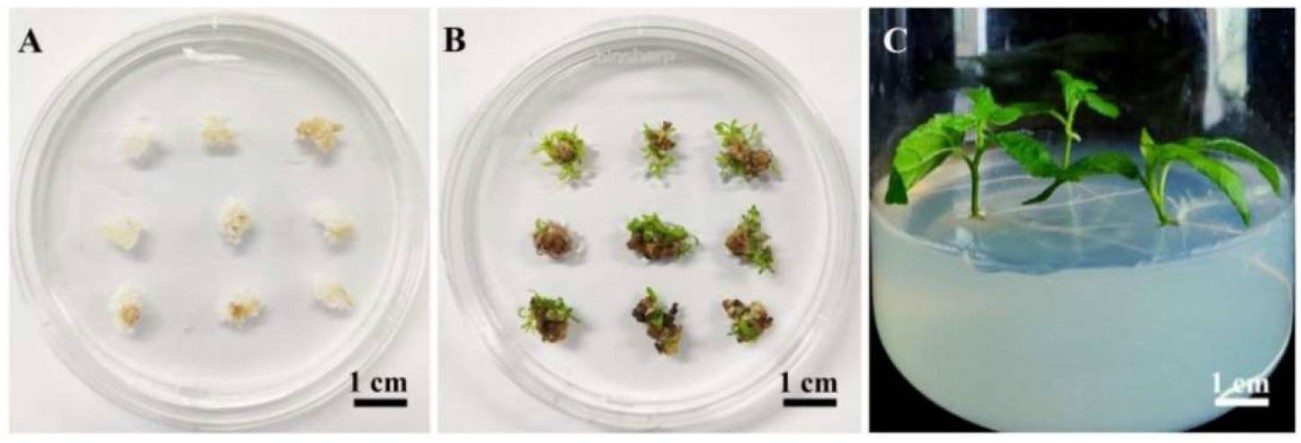Forests cover 30 percent of the Earth's surface and provide natural and social services such as climate regulation, carbon storage, and timber supply. Forests have many specific characteristics distinguishing them from herbaceous plants, such as secondary growth, perennial growth, and seasonal adaptation. However, the underlying mechanisms of these characteristics have been little studied. Because of the long lifespan of tree species, it is difficult for traditional genetic methods (including hybridization and mutagenesis) to propagate these biological processes. Poplar (Populus spp.) is a globally important forest genus because of its early success, high productivity, ease of propagation, and adaptability. In addition, Populus spp. is regarded as a model tree for woody plant genetic studies due to its small genome size, rapid juvenile growth, extensive genome sequence, availability of genetic maps, and the feasibility of genetic transformation. Commercial Populus spp. plantations have expanded rapidly in recent years due to the increasing demand for paper and cardboard fibers. Unfortunately, most poplars are sensitive to drought, which slows growth and development, reduces productivity, and leads to mortality in extreme cases.
 Fig. 1. Regeneration of transgenic 84K plants using the optimized Agrobacterium-mediated transformation system based on calli. (Wen et al., 2022)
Fig. 1. Regeneration of transgenic 84K plants using the optimized Agrobacterium-mediated transformation system based on calli. (Wen et al., 2022)
Lifeasible is an industry leader in plant genetic transformation, providing cutting-edge genetic transformation services for Populus spp. plants. We can establish Agrobacterium-mediated genetic transformation systems for over 30 different poplar lines. Through genetic transformation, we can directly introduce herbicide resistance genes, insect resistance genes, disease resistance genes, drought tolerance, salt tolerance, genes for lignin metabolism, growth and wood quality, abiotic stress resistance, and floral development into Populus spp.
| Section | Populus species/ hybrid | Explant |
| Leuce | Populus alba | Populus alba (clone Villafranca) |
| P. alba | P. alba | |
| P. tomentosa | Leaf disk | |
| P. tremula | Stem internode | |
| P. tremuloides | Stem segment, Leaf disk | |
| P. tremuloides | Hypocotyl | |
| P. alba × P. grandidentata | Leaf disk | |
| P. alba × P. tremula | Internode | |
| White poplar hybrid | P. alba × P. grandidentata | Leaf disk |
| P. alba × P. glandulosa cv. 84K | Leaf disk, Callus | |
| P. alba × P. berolinensis | Leaf disk | |
| P. davidiana × P. bolleana | Leaf disk | |
| White poplar hybrid | P. davidiana × P. bollena | Leaf disk |
| P. canescens × P. grandidentata | Leaf disk | |
| P. kitakamiensis ( P. sieboldii × P. gradidentata) | Leaf disk, Stem internode | |
| P. tremula × P. alba | Stem or leaf, Stem internode, Leaf disk | |
| P. tremula × P. tremuloides | Stem segment | |
| P. tremula × P. tremuloides | Sterile seedling | |
| P. tremuloides × P. davidiana | Leaf disk | |
| P. trichocarpa (clone Nisqually-1) | Stem internode or leaf disk, Stem internode (Greenhouse plant), Stem internode or petiole | |
| Tacamahaca | P. ciliata | Petiole (Greenhouse plant) |
| P. cathayana cv. Zhonglinmeihe | Apical and axillary bud (in situ transformation) | |
| P. angustifolia | Stem internode or axillary bud | |
| P. balsamifera | Stem internode or axillary bud | |
| Aigeiros | P. nigra ( clone San Giorgio and Jean Pourtet) | Leaf disk |
| P. nigra var. italica | Stem Segment, Stem internode (Plants in a growth chamber) | |
| P. deltoides | Leaf disk, Stem internode, or leaf disk | |
| P. deltoides cv. 50 × P. deltoides cv. 36 | Leaf | |
| P. x euramericana | Leaf disk | |
| P. × euramericana cv. '74/ 76' | Leaf | |
| Black poplar hybrid | P. nigra var. betulifolia x P. trichocarpa | Stem internode or leaf disk |
| P. deltoides x P. nigra | Stem internode or leaf disk | |
| P. deltoidles × P. euramericana | Leaf disk | |
| P. trichocarpa × P. deltoides | Stem segment | |
| P. trichocarpa × P. deltoides | Stem segment, Stem segment |
Compared with other woody plants, the Agrobacterium-mediated genetic transformation of Populus spp. is relatively complete. The genetic transformation of Populus spp. is carried out as follows. Among them, the "pre-infestation culture" and the "induction of resistant healing tissues" were optional steps. For different poplar species or hybrid germplasm materials, we will selectively add the above two steps to improve transgenic plants' invasion and regeneration efficiency.

Lifeasible is committed to providing complete, efficient, and stable Populus spp. genetic transformation systems to our customers around the world. We aim to provide systematic information for the development of more poplar varieties for genetic engineering and further improvement of the efficiency of poplar genetic transformation. We also provide a reference for the establishment of genetic transformation systems for other recalcitrant woody plants. If you are interested in our solutions, please contact us for technical consultation and quotation.
Reference